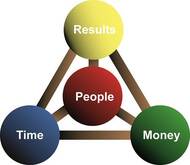-
He (She) Knew; or Should Have Known
Aug 15, 2016
I believe a new standard is coming for the behavior of leaders.
-
Painful Repairs
Jul 6, 2016
The process of solving certain problems requires a physical sacrifice by the problem solver.
-
Learning from your Mistakes
Apr 16, 2016
It is very easy to tell new engineers that they should learn from their mistakes, but often we struggle to explain how we should avoid those mistakes in the future.
-
-
Write it Down
Feb 1, 2016
You will be better than 90% of your competition, if you just follow this one rule: Write it down.
-
Errata-002
Dec 30, 2015
We recently discovered a bunch of conversion errors in the Kindle ebook version of the second edition of An Engineer's Guide to Solving Problems.
-
Offline !
Nov 12, 2015
Some of you might have noticed that recently this website was not available for several days.
-
-
Home, Sweet Home
Apr 26, 2015
The words family and familiar have a common root and surprisingly similar meanings.
-
Thinking is Hard
Jan 25, 2015
Thinking is Hard. There are lots of different kinds of thinking, but this post addresses the thinking associated with making choices and decisions that affect any project or problem-solving effort.
-
When Problem Solving Methods Fail
Sep 28, 2014
Sometimes we simply cannot "solve" a problem to our own satisfaction. There are many reasons this can happen, but these reasons probably do not mean that your problem-solving method was bad.
-
Does sharing knowledge make you less valuable?
Aug 24, 2014
Some people worry that documenting and sharing what they know makes them less valuable. I present arguments that sharing increases your value.
-
Document or Die!
Jul 5, 2014
The DoD Principle is easily summed up with the short statement, "If it's not worth documenting it's probably not worth doing."
-
Saying "Thank You"
Jun 16, 2014
It isn't always easy to remember to say, "Thank You" to people who help us. I want to take a little time to thank some people.
-
Understanding what earns your company money
May 26, 2014
I like to think that almost all companies are in the business of solving problems for their customers.
-
-
What are You Reading?
Dec 19, 2013
I sometimes get asked the question, “What are you reading?” The question means this week or this month, not at this instant.
-
Too Much to Do Today
Dec 3, 2013
A brief essay on the difficulty of balancing urgent or important tasks.
-
EE Interview Questions 3
Nov 13, 2013
Here are four more questions that an Electrical Engineer might encounter during an interview.
-
EE Interview Questions 2
Nov 13, 2013
Continuing the discussion of Electrical Engineer interview questions.







